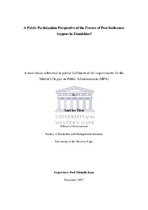A public participation perspective of the process of post-settlement support in Elandskloof
Abstract
Since the dawn of South African democracy in 1994, extensive laws and policies have been
introduced to facilitate transformation in the political, social and economic spheres. While
South Africa has been lauded world-wide for its detailed and sophisticated constitution, many
cases attest to the challenges of implementing the stipulations of the constitution, laws and
policies. Arguably, constitutional rights and entitlements do not automatically result in a
better life for ordinary citizens post-apartheid. Moreover, restitution processes towards
addressing the atrocities of apartheid are fraught with challenges. The process of land
restitution is an example that illustrates the numerous challenges in implementing laws and
public policies in South Africa. Restitution is one of the three pillars of land reform - the
other two are land redistribution and land tenure reform - that were introduced by the African
National Congress (ANC) -led government to secure land rights to black people in South
Africa. Land reform is essential to bring about political and economic development and the
South African government has committed itself to transforming land ownership to reflect the
democratic realities and to redressing the history of dispossession and exclusion suffered by
the black majority of South Africans. While the transfer of land and settlement of claims have
been processed gradually, growing evidence shows that this does not simply translate into
development, poverty reduction or reconciliation.

